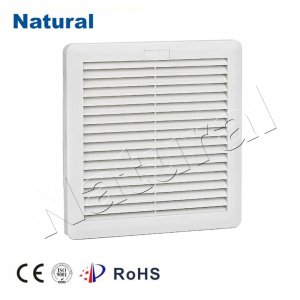In the world of industrial automation and electronics, electrical cabinets play a crucial role in housing sensitive electronic components, control systems, and other vital equipment. These cabinets protect the valuable inner components from environmental factors such as dust, debris, moisture, and even electromagnetic interference. However, over time, the accumulation of these contaminants can lead to reduced equipment performance, increased maintenance requirements, and even premature failure. This is where electrical cabinet filters come into play, as they provide an effective solution to combat these challenges.

The Significance of Electrical Cabinet Filters Electrical cabinet filters are designed to prevent the ingress of particulate matter, moisture, and other pollutants that can compromise the integrity of the equipment housed within. These filters act as barriers, ensuring a clean and controlled environment within the cabinet, thus extending the operational lifespan of the components and reducing the need for frequent maintenance. Benefits of Using Electrical Cabinet Filters Improved Equipment Performance: Dust, dirt, and other contaminants can obstruct airflow and cause overheating, which can lead to reduced performance or even malfunction of electronic components. By installing electrical cabinet filters, you create a controlled environment that promotes optimal operating conditions. Enhanced Reliability: Filters act as a first line of defense against environmental factors that can contribute to equipment failure. This enhanced reliability translates to decreased downtime and increased productivity. Reduced Maintenance Costs: Regular maintenance to clean out accumulated debris from electrical cabinets can be time-consuming and costly. Filters significantly decrease the frequency of such maintenance tasks, resulting in substantial cost savings over time. Extended Equipment Lifespan: With cleaner air and reduced exposure to contaminants, the internal components of electronic equipment are less prone to wear and corrosion. This directly contributes to a longer operational lifespan for your valuable equipment. Protection Against Moisture: Moisture is a common enemy of electronic components, as it can lead to short circuits and corrosion. Many electrical cabinet filters include moisture-resistant features that safeguard the equipment from humidity and moisture-related damage. Mitigation of Electromagnetic Interference: Certain electrical cabinet filters are designed to provide electromagnetic interference shielding. This is crucial in environments where electromagnetic compatibility is essential for the proper functioning of sensitive equipment. Choosing the Right Filter Selecting the appropriate electrical cabinet filter for your specific needs is crucial. Factors such as the cabinet’s environment, the types of contaminants present, and the required level of protection all play a role in determining the ideal filter solution. Particulate Filtration: For environments with high levels of dust and debris, consider filters with finer filtration capabilities to prevent even the tiniest particles from entering the cabinet. Moisture Resistance: If your equipment is at risk of exposure to moisture, opt for filters with moisture-resistant properties to maintain a dry internal environment. EMI/RFI Shielding: In settings where electromagnetic interference is a concern, choose filters with EMI/RFI shielding features to ensure the integrity of sensitive electronics. Conclusion Electrical cabinet filters are more than just protective barriers – they are essential components that contribute to the reliability, performance, and longevity of critical electronic equipment. By implementing the right filter solutions, industries can create a controlled environment that safeguards against various contaminants, ultimately resulting in reduced maintenance costs, enhanced equipment lifespan, and improved operational efficiency. In a world where technological advancements continue to push the boundaries of innovation, electrical cabinet filters stand as a fundamental tool in maintaining the health and functionality of our electronic systems.